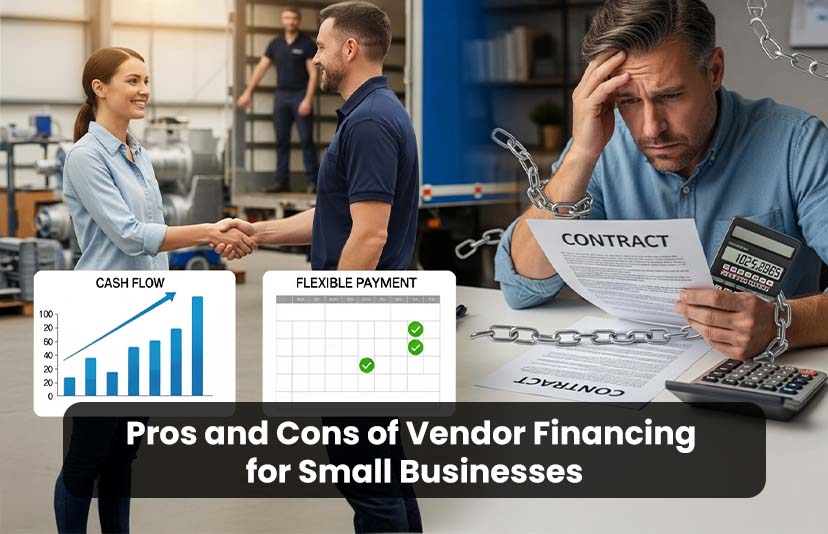- September 17, 2025
- Posted by: admin
- Categories: Vendor financing, Blog

Small businesses have limited liquidity and hence, they find it hard to acquire raw materials, stock inventory, and expand their operations. Vendor financing is a smart solution to deal with these circumstances. Through vendor financing, businesses can purchase goods or services on credit and then pay after a delay, when the cash will actually be received. This removes the gap between current businesses’ needs and delayed cash flow. But just like any financial instrument, it has its pros and cons that any business owner needs to consider.
Understanding Vendor Financing
Vendor financing is a credit arrangement where the supplier will loan the buyer and then allow them to get the services or goods without paying in advance. Small businesses can even negotiate deferrals with suppliers instead of using conventional loans.
This financing model is particularly effective in an enterprise that has a seasonal sales cycle, a new business that has little banking record or a business with a long payment collection cycle.
The Pros of Vendor Financing
Vendor finance also gives small businesses freedom and space to manage their finances. Here are its key advantages –
- Improves Cash Flow Flexibility
The effect of vendor financing on cash flow is one of the largest advantages of vendor financing. Instead of paying the vendors immediately, businesses can pay them later using the funds available to meet urgent needs such as payroll, marketing, or expansion.
- Easy Access Compared to Bank Loans
In most small businesses, it takes a lot of paperwork, collateral, and a good credit record to obtain a bank loan. Vendor financing is usually related to the supplier-buyer relationship and is very easy to obtain.
- Supports Business Growth
When a business uses vendor financing, it can make bigger orders, accumulate stock, and satisfy seasonal demand without the concern of the initial purchase. This is a growth-focused model that assists MSMEs in creating better customer bases and earning more income.
- Builds Supplier Relationships
Businesses are able to use vendor financing to build a stronger relationship with their suppliers. Once the vendors feel that repayments are made on time, they tend to give an extended credit period or even a discount and priority in the future.
- No Need for External Collateral
With vendor financing, unlike with traditional financing, the property or assets are not typically held as collateral. The products provided tend to serve as a security against financial risk to small businesses.
Limitations to Consider in Vendor Financing
Although the benefits are evident, vendor financing also has restrictions that a business should know before using it.
- Higher Costs in the Long Run
Product prices include the financing cost that is usually charged by suppliers. This implies that businesses will pay more than they would in upfront purchases. In other instances, vendor financing may turn out to be costlier than a bank loan.
- Limited Credit Availability
Vendors are not able to extend credit beyond a limit as financial institutions can. Small businesses that need more financing and grow rapidly may be constrained by this limit.
- Risk of Dependency
Excessive dependence on vendor financing may result in a strong reliance of a business on its suppliers. When the supplier chooses to shorten credit terms or cancel financing, the business can get caught financially unawares.
- Impact on Bargaining Power
Companies with vendor financing lose part of their bargaining power. Because they are purchasing on credit, suppliers might not be as influenced to provide discounts or other favourable terms of trade as initial buyers.
- Strict Payment Schedules
Late payment under vendor financing may affect relations with suppliers and create a negative image of a business on the market. The suppliers can also stop further supply, as compared to the banks, in case of defaults.
Vendor Financing vs Other Options
Financing provided by the vendors should be compared with other options such as trade credit, factoring, or working capital loans. Trade credit is similar, but bank loans have more credit, and they are repaid by instalment. Factoring, however, will enhance liquidity by changing the pending invoices into instant cash.
In the case of MSMEs, the decision usually relies on their size, the sector in which they operate, and their capacity to handle the relationships with their suppliers.
Turning Vendor Credit into a Business Opportunity
The question of whether to use vendor financing or not is a matter of weighing the short-term advantages against the long-term expenses before making the decision. It is capable of relieving cash flow pressure and facilitating growth, but can also increase the cost and create dependency when mismanaged.
Whereas vendor financing is an excellent alternative, businesses may require other tools to effectively run their working capital. Finance providers such as Credlix make financing easier by providing invoice discounting, export factoring, and MSME-specific digital solutions. Credlix will enable businesses to grow at a sustainable pace by decreasing the turnaround time of payments and reducing supplier credit risks.
So, if you are looking to decide if vendor financing suits your small business, learn more about Vendor Financing solutions for small businesses.
Frequently Asked Questions
Q1: Should vendor financing be used by startups?
Yes, startups that do not have any credit history or collateral tend to use vendor financing. It, however, relies on creating good supplier trust.
Q2: What is the difference between vendor financing and bank loans?
Vendor financing is less expensive to obtain than bank loans, but it does not require any collateral and is usually more expensive than bank loans.
Q3: Is it possible that vendor financing has an impact on supplier relationships?
Yes, when the repayments are made on time, the vendor financing enhances supplier confidence. But late payments are counterproductive to relationships in the long run.